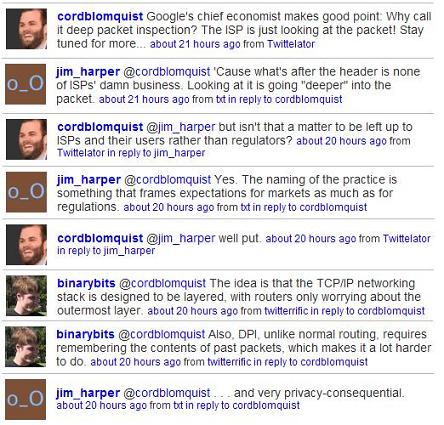The more I hear about people’s experiences getting back from Aspen, the more I want to brag about my double-top-unsecret, non-patented method of accessing the rarified air of that mountain hideaway. Fly to Denver and drive up and back.
This:

Will get you this (click for the whole thing):

And get you this:

Tom Lee critiques professional gossip-turned-professional-navel-gazer Emily Gould, who has a new article about the supposed shallowness of Shirky style Internet triumphalism:
Gould thinks Shirky is a callow idealist, but he’s not. He’s just noting the incredible bounty that technology can afford us while politely declining to complain about the places where it falls short.
Not only is Gould preoccupied with the latter, she’s blind to the former. And hey, I can relate. Digital technology has its own Benjaminian aura, you know — excitement born of novelty, and exclusivity, and revolutionary rhetoric. Once that novelty wears off, though, things can start to look kind of drab. I mean, it’s exciting that the world has collaboratively built an encyclopedia! But it is an encyclopedia. And the idea of an encyclopedia — a comprehensive reference document written without passion or position — is actually kind of boring. The same holds for social communication and our lofty rhetoric about the triumph of a world where information can flow freely. Once you’re done patting yourself on the back you need to start paying attention to what people are actually saying. And that’s hard. Sometimes it’s even boring.
It’s depressing when you realize how much of your excitement about a thing was tied up in its aura; to find out that superficial considerations formed the basis of your enthusiasm. I struggle with this myself: I’m overcome with contempt at every useless, vowel-less internet startup I see, its founders desperate to think of themselves as brilliant revolutionaries despite no one — least of all them — actually caring a whit about what they say they’re trying to do. But that contempt is motivated in no small part by feeling the exact same ignoble impulse.
I think this is basically right, but I’d make a somewhat stronger case. It’s certainly true that the most superficial aspects of the Internet get a lot of press, but I think it’s important not to let the existence of such froth obscure the enormous flow of real, non-superficial value that the Internet revolution is producing. The non-frothy parts of the Internet seem boring precisely because they’ve become so profoundly important to our society that we’ve started taking them for granted.
Continue reading →
WASHINGTON, August 19 – BroadbandCensus.com is pleased to support One Web Day, and I am very happy to be an Ambassador for this effort.
Most Americans who have high-speed internet can’t imagine life without broadband. How could you connect to the Internet of today without it? In today’s world, broadband is as basic as running water and electricity. And yet the U.S. is falling behind globally.
As a technology reporter, I’ve been writing about the battles over broadband and the Internet for more than a decade here in Washington. Yet there is one fact about which nearly everyone seems to be in agreement: if America wants better broadband, America needs better broadband data.
That’s why I’ve recently started a new venture to collect this broadband data, and to make this data freely available for all on the Web at http://BroadbandCensus.com.
One Web Day presents an opportunity for all of us to take stock with the true state of broadband in this country. BroadbandCensus.com wants to work with each of you to help us “crowdsource” the data we need to get a better handle on availability, competition, speeds, prices, and quality of service of local broadband.
What is BroadbandCensus.com?
When an Internet user goes to the BroadbandCensus.com web site, he or she types in a ZIP code. By doing so, the consumer will find out how many broadband providers the FCC says are available. The consumer can compare that number to his or her own sense of the competitive landscape, as well as the names of the carriers published by BroadbandCensus.com.
Continue reading BroadbandCensus.com Joins with One Web Day
How much platform competition is too much competition? For example, what is the optimal number of mobile operating systems or video game consoles that will spur competition and innovation in those respective sectors?
It is an interesting business question, but it also has some policy implications since some might propose laws or regulations to remedy a perceived lack of platform competition in various sectors. After all, many people would answer the above question by saying that there is never such a thing as too much competition. The more platforms the better. But there can be costs associated with too much competition. Let’s consider those two case studies mentioned above: mobile operating systems or video game consoles.
Mobile Operating Systems
As my colleague Berin Szoka has pointed out, we are witnessing the rapid proliferation of mobile operating systems, especially on the open source front. So, we’ve got Apple’s iPhone platform, Microsoft’s Windows Mobile, Symbian, Google’s Android, the LiMo platform, and OpenMoko.
One one hand, all this platform competition sounds great. But as Ben Worthen of the Wall Street Journal’s “Business Tech Blog” points out in a piece today:
Continue reading →
The concept of deep packet inspection has come up a couple of times here at the Progress & Freedom Foundation’s Aspen Summit. And I’ve been interested to find people in other fora talking about deep packet inspection in the way they used to talk about cookies: “You’ll get to like once you understand what it is.”
I’m not so sure. Here’s a sample discussion of the issue among us TLFers, conducted on Twitter yesterday. (I’ve reorganized the tweets, so you can read from top to bottom.)

So I’m enjoying the high-caliber presentations so far at the PFF Aspen Summit. (Full disclosure: I spoke on the first panel dealing with intermediary liability.) But I’ve heard a couple of speakers say things that made me ask, “Where’s Mike Masnick?”
Jim Griffin of OneHouse kicked off the morning. He’s an advisor to the Warner Music Group. I didn’t write anything down, so risk mischaracterizing what he said, but one of the premises in his keynote was that creators of music and other digital content have to paid for producing that content.
Likewise, as he was setting up the second panel discussion, Tom Sydnor of PFF took it as a given that producers of copyrighted content have to paid for that production, and that the problem is figuring out how to get them paid. The premise behind this conclusion is one that should be explored.
I take it as a given that intellectual property law should promote the progress of science and useful arts. There are differences on this question, as proponents of moral rights will tell you. But taking creation of new works as the goal, what does it take to make that happen? Do creators need to be paid for their production all the time? Or can we sometimes get the benefit of their production while requiring them to earn money elsewhere, such as by bundling their creative works with other works. This is something TechDirt’s Mike Masnick has harped on for years now. He summarized his thinking to date a year or so ago in his “Grand Unified Theory On The Economics Of Free” post.
To summarize: Having fun. Good discussions. I want more! Specifically, more breadth! The economics of free is (are?) an elephant in the room.
Brrrrrr! It was cold at the opening reception of the PFF Aspen Summit.
But there was sushi!
Over on Techdirt, Mike Masnick discusses an interesting new survey that highlights the sharp disconnect between how much we claim privacy matters to us and how far we’re willing to go to safeguard it. America Online polled 1,000 users in the United Kingdom, and the results further reinforce what other recent studies have suggested:
The study found 84% of users say they carefully guard their info online — but when tested, 89% of people actually did give away info in the same exact survey.
The AOL survey brings to mind security guru Bruce Schneier’s insightful quip on privacy from back in 2001:
If McDonald’s in the United States would give away a free hamburger for a DNA sample they would be handing out free lunches around the clock. So people care about their privacy, but they don’t care to pay for it.
When presented with the option of sacrificing a bit of privacy for something of value, like a chocolate bar or a free gift certificate, many users are surprisingly willing to dole out data to third parties for commercial use. And the value of personal details to marketers is massive. As social networking sites and ad-serving networks amass ever greater knowledge of our hobbies, political views, and even our favorite music, these sites are getting better at mining data to tailor ads with pinpoint precision, commanding high click rates while sustaining server farms and original content publishers.
Continue reading →
Soren Dayton has some interesting commentary at NextRight on the candidates’ technology policies and criticisms thereof.
A representative critic on the left engages in “unserious technology fetishism,” says Dayton. His foil is Joho the Blog, who takes after Senator McCain’s technology policy thusly:
There is nothing — nothing — in his policy statement that acknowledges that maybe the Net is also a new way we citizens are connecting with one another. The phrase “free speech” does not show up in it. The term “democracy” does not show up in it. What’s the opposite of visionary?
Joho wants government technology rhapsody, and Dayton has had enough:
Does he really want government policy to regulate the “cultural, social, and democratic” aspects of anything? Should these be the subject of tax policy? Which government agency? Should we make a new “Federal Cultural and Social Regulatory Agency?”
There’s something to this criticism. Too many folks see technology as the story, and they think government policy will write the next chapter.
No. People are the story: the people who invent, build, experiment with, and use technology to do interesting things, have fun, and make their lives better.
A policy that gets the government out of the way is a policy that’s true to technology and its role.
Several of us here have outlined our reservations about the proposal to allocate a block of the Advanced Wireless Services (AWS) spectrum for a free, nationwide wireless service. (Here’s a filing I signed on to that critiques the portion of the plan that requires censorship of the entire band once allocated).
But, strictly from an economic perspective, this is the best overview and critique of the plan I have seen so far: “The Static and Dynamic Inefficiency of Abandoning Unrestricted Auctions for Spectrum,” by Bob Hahn, Allan Ingraham, Greg Sidak, and Hal Singer. It’s a response to a paper favoring the M2Z plan that was penned by Simon Wilkie of USC, who also formerly served as the Chief Economist of the FCC. (Wilkie’s work on behalf of M2Z can be found on the M2Z site here). It’s a good debate and I encourage you to look at both papers if you are interested in this issue.





 The Technology Liberation Front is the tech policy blog dedicated to keeping politicians' hands off the 'net and everything else related to technology.
The Technology Liberation Front is the tech policy blog dedicated to keeping politicians' hands off the 'net and everything else related to technology.